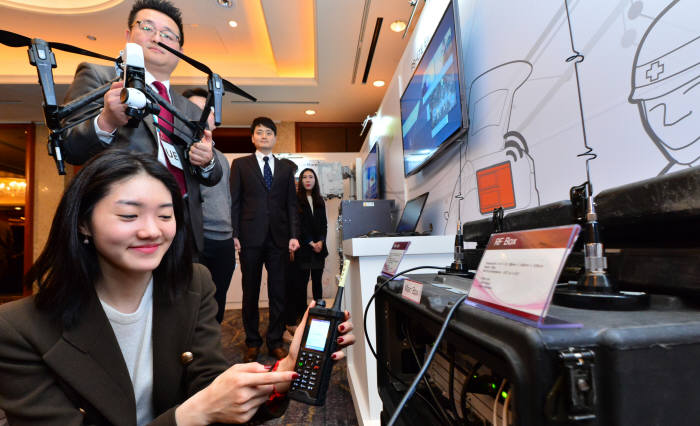
China’s largest network company Huawei said that it would bid for the National Disaster and Safety Communication Network project in Korea.
Armed with a total lineup including network equipment and terminals using its own chipsets, it seems to be banking on this project.
As Huawei has already encroached on most of the backbone network of domestic mobile carriers, it is expected to be the toughest competitor in the National Disaster and Safety Communication Network project. As there is still much concern over Chinese communication equipment, and many voices are calling for the participation of Korean SMEs in the National Disaster and Safety Communication Network project, however, Huawei is expected to have much difficulty.
Huawei held a press conference at Lotte Hotel in Seoul in January 28, and unveiled the Public Safety LTE (PS-LTE) solution for the first time in Korea. This solution included chipsets, the push-to-talk (PTT) server for direct connection to the commercial network, base stations and terminals. It also demonstrated the direct mode operation (DMO), which is regarded as the core technology of the National Disaster and Safety Communication Network project.
The core technology of Huawei’s PS LTE, is the ‘LTE trunking,’ capable of transmitting high-definition data with high bandwidth. Huawei has been participating in the emergency network projects of 30 or so countries around the world since it commercialized this technology in 2012.
Huawei said that the strengths of its emergency network technology are △ real-time broadband-based voice and images △standardized and professional system △ reliable and stable service in a poor environment. It also emphasized the ease of equipment setup, e.g. it takes only 30 minutes to install a base station.
“Huawei’s management philosophy is not focused on money-making,” said Wang Qingwen, Huawei’s global vice-president in charge of LTE products. “Based on our experience and technology, our goal is to grow together with our partner, and contribute to the Korean National Disaster and Safety Communication Network standard becoming a global standard.”
Like ZTE and Nokia that demonstrated this technology last year, Huawei displayed confidence in stable operation of the National Disaster and Safety Communication Network. TO actually participate in the project, however, it must solve a few issues. The first issue is cooperation with local mobile carriers.
The Ministry of Public Safety and Security is mulling over whether to separate the National Disaster and Safety Communication Network project into two or three segments, e.g. the operation center, base stations and networks and terminals, or put everything into one order. As a local company is highly likely to supply the terminals, Huawei, focusing on communication equipment, must joins forces with mobile carriers to take part in the project in any case.
“Mobile carriers may join hands with Huawei in terms of price, but as the National Disaster and Safety Communication Network is connected to public networks like the administrative networks, security concerns may drag it down,” said a mobile carrier insider. “LG Uplus, using Huawei equipment, as well as SK Telecom and KT may not make a decision easily.”
Mutual growth with Korean companies is as important as the security issue. One of the government’s National Disaster and Safety Communication Network project is to give maximum opportunities for domestic SMEs. Huawei’s having a total lineup may mean that there are few opportunities for local companies.
“Even if we have total solutions, we may not provide everything,” said Wang Qingwen about this. “When we worked with LG Uplus in the past, we provided opportunities for Korean SMEs, and likewise we will cooperate as much as possible where cooperation is needed.”